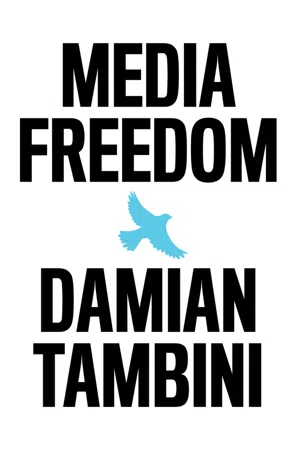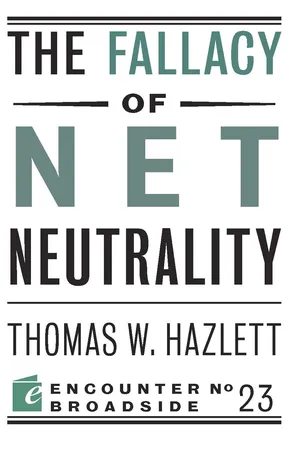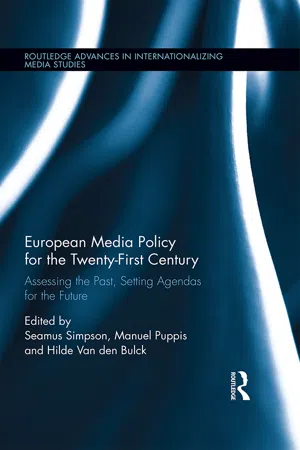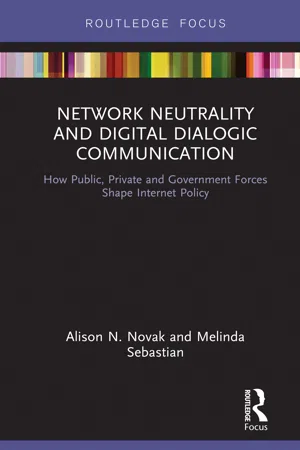Social Sciences
Net Neutrality
Net neutrality is the principle that all internet traffic should be treated equally, without discrimination or preference given to certain websites or services. This means that internet service providers should not be able to block or slow down access to specific websites or charge extra fees for faster access. The concept is important for maintaining a free and open internet.
Written by Perlego with AI-assistance
Related key terms
7 Key excerpts on "Net Neutrality"
- eBook - ePub
Network neutrality
From policy to law to regulation
- Christopher T. Marsden(Author)
- 2017(Publication Date)
- Manchester University Press(Publisher)
Introduction: neutrality, discrimination and common carriageWe cannot allow Internet service providers to restrict the best access or to pick winners and losers in the online marketplace for services and ideas. That is why today, I am asking the Federal Communications Commission [FCC] to answer the call of almost 4 million public comments, and implement the strongest possible rules to protect Net Neutrality. When I was a candidate for this office, I made clear my commitment to a free and open Internet, and my commitment remains as strong as ever … The FCC is an independent agency, and ultimately this decision is theirs alone.President Barack H. Obama1Net Neutrality is a zombie2 that has sprung to life recently. It is a policy of Internet3 non-discrimination based on innovation, free speech, privacy and content provider commercial self-interest, imposed on the technocratic economic regulation of telecommunications (telco) local access networks. The regulators, telcos and governments don’t like it one bit. The laws and regulations are formally ‘Open Internet’ not ‘network neutrality’, as I will explain. It is Net Neutrality 2.0, to use a cliché in explaining the second wave of a technology-led innovation.4 Net Neutrality is the principle that Internet Access Providers (IAPs) do not censor or otherwise manage content which individual users are attempting to access. That means that telcos should not block or ‘throttle’ Voice over Internet Protocol (VoIP, e.g. Skype, WhatsApp) or video (e.g. YouTube, BBC iPlayer or NetFlix) except under narrowly defined conditions. Net Neutrality regulation is critical to the future of Internet access for businesses and micro-enterprises, as well as students, citizens and all domestic users – and therefore to the future mass adoption of the Internet of Things (IoT), cloud computing and Big Data. In this book I claim, as Zhou Enlai stated of the French revolutionary movement in 1968 (not 1789),5 - eBook - ePub
- Damian Tambini(Author)
- 2021(Publication Date)
- Polity(Publisher)
On the other hand, economists tend to see regulation as potentially undermining the market’s ability to develop new products to meet consumer needs: if consumers want access only to a ‘walled garden’ of limited content providers at a rock-bottom price, with an inability to access alternative services or the open internet, they should be free to choose (and pay for) that limited range of information alone. This is an old debate, and the question of whether a limited package of ‘free basics’ is preferable to no access at all is a difficult one to resolve.During the first two decades of the twenty-first century, Net Neutrality gradually began to be seen as crucial to the future of media freedom and individual freedom of expression.30 However, while Net Neutrality may maximize the content which most net users can access, and in that sense offers a form of ‘liberty by design’, it lacks a framework for accountability or balancing of rights. An absolute principle of Net Neutrality offers the same distribution privileges to educational content and gaming, emergency services and terrorist speech, political speech and porn, art and spam. In the event that the latter speech imposes a cost on the former (e.g. by the issue of death threats), or renders it impossible, it might be sensible for the absolute principle of Net Neutrality to be qualified. This is why most Net Neutrality rules are not absolute, but qualified, in the form of a ‘reasonable traffic management’ standard.31What constitutes ‘reasonable traffic management’, who decides, and according to what criteria is often a relatively obscure negotiation between network and content provider, although as a form of speech regulation it should be scrutinized. Decisions about which forms of speech should benefit from the free distribution provided by the internet, and which should not, should never be seen as a ‘technical’ issue.Net Neutrality, then, is one part of a design ideal for the internet, but not the whole picture. It offers a distribution subsidy to superior layers by restricting competition between layers. If one examines the market for distribution of the main bandwidth-hungry services, such as the video-streaming, gaming and video-conferencing services, however, we see that they are supplementing their use of the public internet with other, more efficient private services. Recent debates around the world have cast Net Neutrality as part of a settlement for internet communication liberty: some argue that, by preventing the control of speech by the private companies that control networks, free speech is being protected against control by private actors. This contrasts with earlier approaches to internet freedom, which, on the model of US negative rights approaches, were more concerned with state control of speech. - eBook - ePub
- Ashley Packard(Author)
- 2012(Publication Date)
- Wiley-Blackwell(Publisher)
ICANN requires registrars of domain names to log information about domain name registrants in the publicly available database Whois. Information collected includes the domain name, the date the domain was created, the date it will expire, the registrar, the name of the domain owner and the domain owner’s contact information. If the registrar offers private registration, contact information is supplied for the registrar instead. Privacy advocates complain that anyone can search through Whois to find the source of information of Internet speech, interfering with anonymity.The National Telecommunications and Information Administration explained its purpose in holding on to the IANA as a matter of security “given the Internet’s importance to the world economy.”11 However, it also allows the United States to exert pressure on ICANN policies through its yearly negotiation of the IANA contract.Network Neutrality
The Internet governance movement describes freedom of expression as one of its primary goals but conceptualizes the issue in terms of network neutrality. Network neutrality is the principle that all content flowing through the Internet should be treated equally. Applied as policy, however, the term can be confusing because it actually has two meanings. Internationally, network neutrality refers to the idea that end-to-end Internet use should be unimpeded, regardless of content, application, or sender. International advocates of Net Neutrality want to eliminate barriers to Internet access. Domestically, the term network neutrality refers to the notion that high-speed Internet, or broadband, access providers should not be allowed to show preference to certain providers of content or types of content by supplying them with faster service. Advocates of Net Neutrality as end-to-end access would prefer that Americans not use the term network neutrality in relation to bandwidth management. From their perspective, it trivializes a much larger issue – universal access to the Internet generally and more specifically to its content. Both ideas are discussed in the next section. - eBook - ePub
- Thomas W Hazlett(Author)
- 2011(Publication Date)
- Encounter Books(Publisher)
EW NETWORK NEUTRALITY RULESThe U.S. Federal Communications Commission, seeing the Internet as a fragile ecosystem under threat from opportunistic broadband providers, issued its “network neutrality” order 1 on Dec. 23, 2010. The danger was intense and systemic. “Allowing gigantic corporations,” wrote Commissioner Michael J. Copps, “to exercise unfettered control over Americans’ access to the Internet not only creates risks to technological innovation and economic growth, but it poses a real threat to freedom of speech and the future of our democracy.”2On Jan. 10, 2011, the FCC received its first official complaint – not against a “gigantic corporation” but an upstart wireless competitor providing innovative services, advanced technologies, and new options for low-income consumers.The targeting of socially valuable entrepreneurship is hardly an accident. The regulatory effort – “preserving the free and open Internet,” as the FCC frames it – mistakes the benefits of market rivalry for an architectural design. Competitive forces have driven firms to create vast data networks, continually upgrading their scope, speed, and quality. Cooperative agreements among these systems permit traffic to flow seamlessly through myriad gateways across the U.S. and around the world. Customers flock to these networks, eager to access a wondrous world of websites and online services, a thriving digital bazaar. This bountiful marketplace has emerged unplanned, unregulated, from the visions of technologists, the risks of venture capitalists, and the innovations of entrepreneurs, large and small.The FCC mistakes the benefits of market processes for a planned industrial structure, imposing new rules to “protect” what evolved without it .But that may change. Net Neutrality (NN ) rules restrict how companies may price and package computer network services. The rules prohibit bargains or bundles that are seen to discriminate among applications. Regulators see danger lurking in your broadband ISP , the cable TV system putting you online via a cable modem, or the telephone carrier connecting you via a digital subscriber line (DSL ) or fiber-to-the-home (FTTH - eBook - ePub
New Media and Freedom of Expression
Rethinking the Constitutional Foundations of the Public Sphere
- András Koltay(Author)
- 2019(Publication Date)
- Hart Publishing(Publisher)
discretion (except if ordered to by a court or other authorities). If network neutrality is not enforced, ISPs would be able to collect substantial revenues if they charged extra money for faster transmission of certain content, and similarly they could slow down the transmission of content from non-paying service providers. Such a practice could damage the free speech of content providers and the users’ interests in relation to obtaining information. Ignoring network neutrality is unethical; it restricts market competition, reduces innovation, can damage privacy and is not transparent. 43 At the same time, reasonable and legitimate traffic management, carried out in order to meet technical requirements or comply with the decisions of authorities or courts (such as the blocking of illegal content), is not incompatible with network neutrality. Although the requirement of network neutrality prohibits ISPs from any arbitrary and illegitimate interference in the process of data transmission, the fulfilment of requests by the state that are substantiated by appropriate decisions is not prohibited. If we consider ISPs as common carriers as under US law, the legal obligation of neutrality, similar to that of the operators of fixed (landline) telephone networks, can be justified. This is an age-old debate in US law - eBook - ePub
European Media Policy for the Twenty-First Century
Assessing the Past, Setting Agendas for the Future
- Seamus Simpson, Manuel Puppis, Hilde van den Bulck(Authors)
- 2016(Publication Date)
- Routledge(Publisher)
Harvard Journal of Law & Technology , 19(1), 1–77.- Yoo, C. S. (2012). Network neutrality and the need for a technological turn in Internet scholarship. In M.E. Price , S.G. Verhulst & L. Morgan (Eds.), Routledge handbook of media law (pp. 539–555). New York: Routledge.
- Zittrain, J. (2008). The future of the Internet and how to stop it . New Haven & London: Yale University Press.
Passage contains an image
10 Access to the Network as a Universal Service Concept for the European Information Society
Olga Batura DOI: 10.4324/9781315719597-10Introduction
The omnipresence and impact of information and communications technologies (ICTs) on all spheres of life and their increased utility for economic activity (both business and working), political participation and organisation of leisure have become characteristic of the society we live in. The revolutionary technological processes of digitalisation and convergence have become so common that users are not aware of them most of the time. In this new Information Society (Webster, 2001 ) they expect instant communication at any time, at any location and over any type of network – satellite, cellular, radio, copper wire, cable, fibre or powerline. Consumers ignore the technological and regulatory difference between the functionally similar services of audio (traditional voice telephony versus VoIP) or video (video-streaming versus broadcast) transmission, but pay attention to the performance and capacity of their Internet connection to be able to enjoy ever-richer converged communication services.In this ‘media-saturated environment’ (Webster, 2003 ) we learn to deal with the newly acquired freedom from limitations of time and space and with the blurring boundaries between different spheres of living (van Dijk, 2006 ). Interpersonal (horizontal) interactive communication dominates the landscape by contrast to unidirectional mass communication, which prevailed before (Castells, 2011 ). The concept of citizenship is changing as ICT has become essential for participation in social and economic life and in government. The minimum of information necessary to survive in such a society is growing so that information – and the means and ways to access and transmit it – can be considered primary goods (Rawls, 1971 - eBook - ePub
Network Neutrality and Digital Dialogic Communication
How Public, Private and Government Forces Shape Internet Policy
- Alison N. Novak, Melinda Sebastian(Authors)
- 2018(Publication Date)
- Routledge(Publisher)
1 Overview of Network NeutralityIn a 2017 article from Medium, Simon reflected on the historical and current truth behind network neutrality:The fight over Net Neutrality is one of the most important political debates America is facing at the moment…And yet, there is one odd thing. Type “Net Neutrality” into your search bar and you will inevitably get a variation of one particular article as a result: The ‘Why you should care about Net Neutrality’-piece .’1Simon’s reflection is correct; the internet is filled with thousands of articles that attempt to convince the public that network neutrality is a critical issue for 21st-century citizens. Beyond these cries for civic attention, the articles also suggest that there is a culture and history of citizen apprehension and ambivalence toward the regulatory topic. Although there are groups of involved and engaged citizens, the overall conclusion is that network neutrality, although important, is largely removed from public attention. Perhaps this backdrop illustrates the mandate to research and understand the moments of engagement throughout the network neutrality debate. Their perceived rarity (by journalists) encourages the examination of other forces, such as organizations, regulators, journalists and elected officials, in the network neutrality debate and how they shape contemporary policy. In addition, if there is a perception of a disengaged public, this suggests a need for scholarly attention to engagement, in the form of digital dialogic communication practices. Dialogue involves a desire for communication and adjustment from both participating parties. If one party is disengaged (or perceived as disengaged), then the ability to form a true dialogue may be challenged, as sociologist Eliasoph described the hesitation of public involvement in politics or policymaking.2A large deterrent to public engagement rests on the perception that public policy is unapproachable and largely handed down from government elites. However, as Weible, Sabatier and McQueen argue, this perception of elitism is faulty, and in reality, most public policies are co-constructed by a number of actors invested in the process, including members of the public.3 Thus, public policy is a construction of the values of government, public, media and organizational interests.4
Learn about this page
Index pages curate the most relevant extracts from our library of academic textbooks. They’ve been created using an in-house natural language model (NLM), each adding context and meaning to key research topics.






